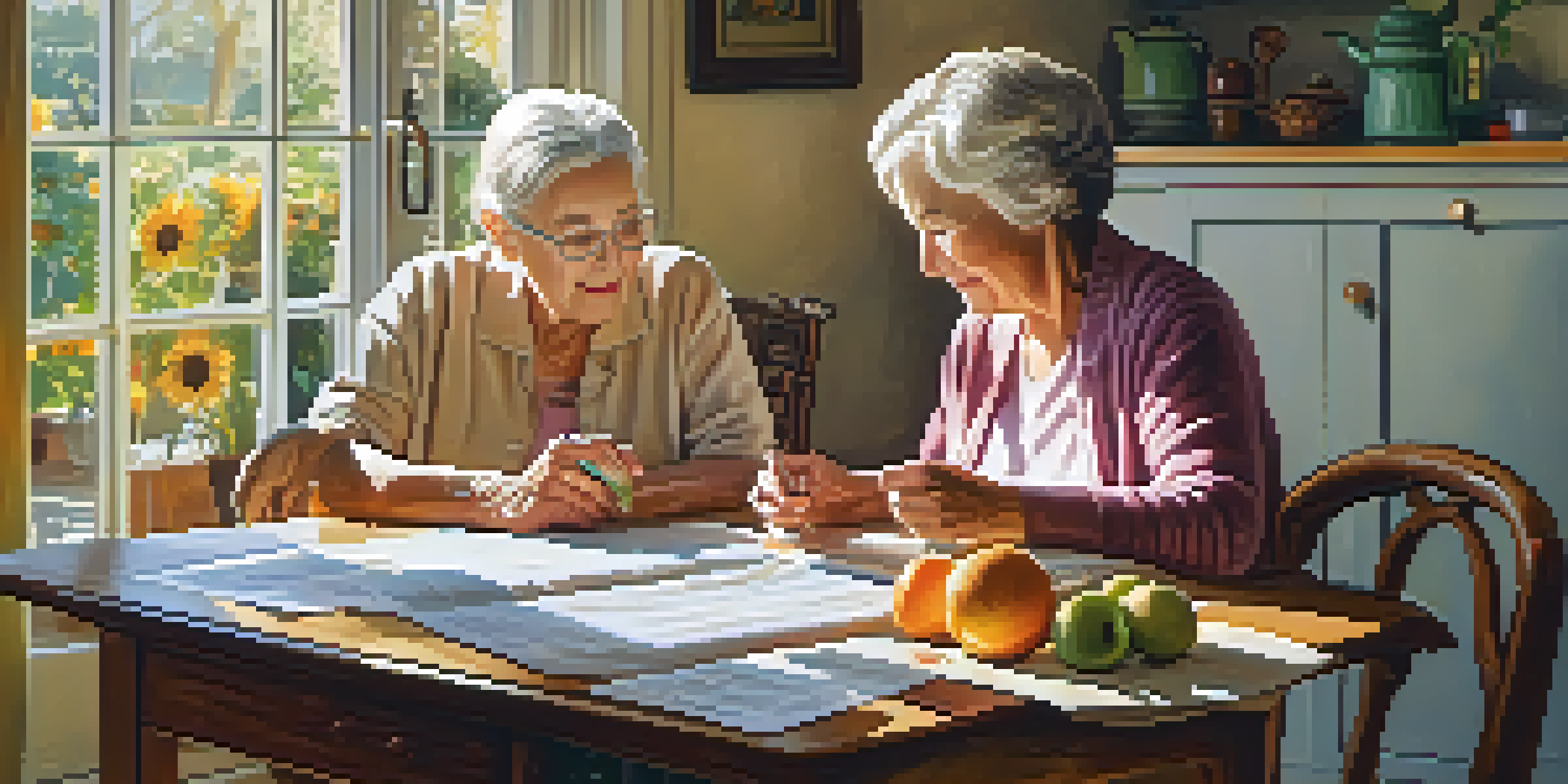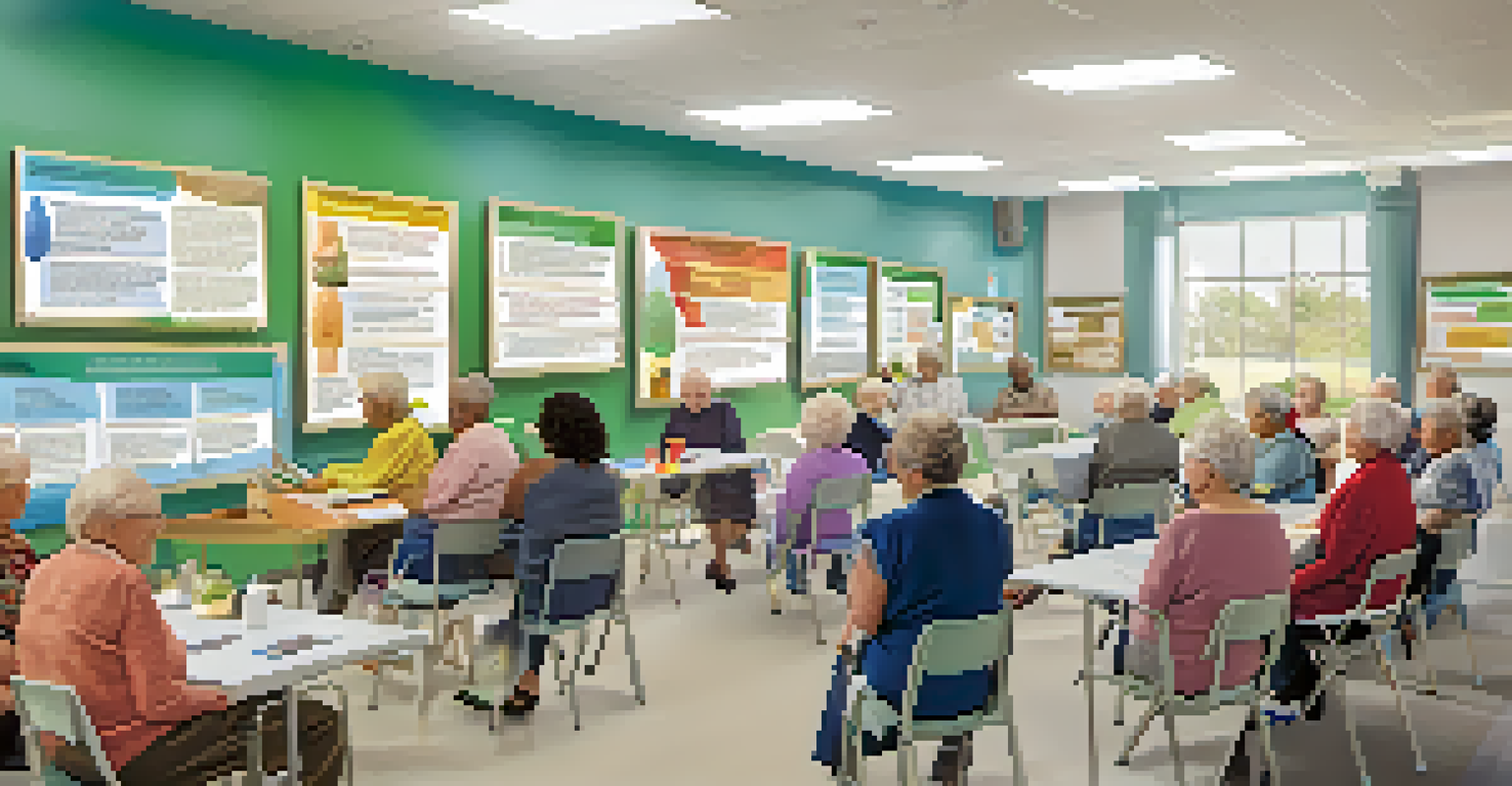Health Literacy and Aging: Challenges for Older Adults

Understanding Health Literacy and Its Importance
Health literacy refers to the ability to obtain, process, and understand basic health information. For older adults, this skill is crucial as it directly impacts their ability to make informed health decisions. Without proper health literacy, they may struggle with everything from understanding medication instructions to navigating healthcare systems.
Health literacy is a crucial factor in achieving health equity and improving health outcomes.
As we age, cognitive changes can make it harder to grasp complex information, which is why health literacy remains a vital topic. Imagine trying to assemble a piece of furniture without clear instructions; that’s similar to what older adults experience with healthcare information. Their health outcomes often depend on their ability to comprehend these materials.
Moreover, a lack of health literacy can lead to miscommunication with healthcare providers, resulting in poor health management. It’s essential to recognize that health literacy isn't just about reading ability; it's about understanding and applying information to enhance one’s health.
Barriers to Health Literacy in Older Adults
Older adults face numerous barriers that can hinder their health literacy. These include cognitive decline, physical impairments, and limited exposure to technology. For instance, someone with vision problems may struggle to read prescription labels, while another might find it challenging to navigate online health portals.

Additionally, the language used in health materials can be a significant barrier. Medical jargon can feel like a foreign language to those not familiar with it, making it harder for seniors to grasp essential information. This situation is akin to trying to learn a new recipe without understanding the cooking terms involved.
Health Literacy is Crucial for Seniors
Understanding health information is vital for older adults to make informed healthcare decisions and manage their health effectively.
Social factors also contribute to health literacy challenges. Older adults who live alone or lack a support network might find it especially daunting to seek help or clarification about their health needs. These barriers can create a cycle of misunderstanding and mismanagement of health issues, necessitating targeted interventions.
The Role of Healthcare Providers in Improving Literacy
Healthcare providers play a crucial role in enhancing health literacy among older patients. By using clear, simple language and avoiding jargon, they can make health information accessible. For example, instead of saying 'hypertension,' a doctor might simply say 'high blood pressure,' which is easier to understand.
The ability to read and understand health information is essential for making informed health decisions.
Moreover, taking the time to check for understanding can significantly improve patient outcomes. Providers can ask questions like, 'Can you explain how you will take this medication?' This technique not only encourages dialogue but also empowers older adults to take control of their health.
Creating a welcoming environment where patients feel comfortable asking questions is essential. When older adults know they can seek clarification without judgment, they’re more likely to engage in their healthcare process, leading to better health management.
Utilizing Technology to Bridge the Gap
Technology can be a powerful tool in improving health literacy among older adults. Telehealth services, for instance, allow seniors to interact with healthcare providers from the comfort of their homes. This convenience can reduce barriers related to mobility and transportation, making healthcare more accessible.
Moreover, user-friendly health apps can help older adults track their medications and appointments. These apps often provide reminders and clear instructions, which can simplify complex health tasks. Think of it as having a personal assistant who keeps you organized and informed.
Barriers Hinder Health Literacy
Cognitive decline, physical impairments, and complex medical jargon create significant challenges for older adults in comprehending health materials.
However, it’s essential to ensure that technology is introduced gradually and with adequate support. Providing tutorials or assistance in navigating these tools can help older adults feel more confident. By making technology accessible, we can enhance their overall health literacy.
Community Programs Supporting Health Literacy
Community programs play a vital role in promoting health literacy among older adults. Local libraries, senior centers, and community health organizations often host workshops that focus on health education. These programs can cover topics like managing chronic conditions, understanding medications, and navigating healthcare services.
By engaging older adults in group settings, these programs foster a sense of community and support. Participants can share experiences and learn from one another, making the learning process more relatable and enjoyable. It’s like a book club, but instead of discussing novels, they’re discussing health and wellness.
Furthermore, these initiatives can tailor content to the specific needs of the community, ensuring relevance and effectiveness. When older adults feel empowered with knowledge, they’re more likely to make informed health decisions that positively impact their lives.
The Impact of Health Literacy on Aging Well
Health literacy significantly influences how well older adults age. Those with higher health literacy are more likely to engage in preventive care and manage chronic conditions effectively. This proactive approach can lead to better overall health outcomes and improved quality of life as they age.
Conversely, low health literacy can result in increased hospitalizations and poor health management. Imagine trying to steer a car without understanding the controls; that’s the reality for those lacking health literacy. They may miss crucial health screenings or mismanage medications, leading to detrimental consequences.
Community Programs Enhance Knowledge
Local workshops and community initiatives empower seniors by providing essential health education and fostering supportive networks.
Ultimately, fostering health literacy is essential for empowering older adults to take charge of their health. By equipping them with the knowledge and tools they need, we can help them navigate the challenges of aging with confidence and resilience.
Advocating for Policy Changes to Support Seniors
Advocating for policy changes is crucial in addressing health literacy challenges faced by older adults. Policymakers can implement initiatives that promote health education and access to resources for seniors. For instance, policies could mandate that health materials be written in plain language and tested for comprehension.
Moreover, increasing funding for community health programs that focus on education can help bridge the gap. These initiatives can create a supportive environment where older adults feel empowered to learn about their health in a way that resonates with them. It’s like giving them a map to navigate their healthcare journey.

By working together—healthcare providers, community organizations, and policymakers—we can create a comprehensive approach to improving health literacy. This collaborative effort will not only benefit older adults but also enhance the overall health of communities.